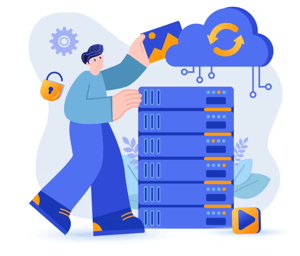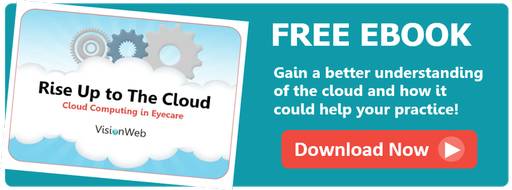4 Reasons People Avoid Cloud Storage in Eyecare
Many ODs have fears associated with the use of cloud computing in eye care. With the lack of knowledge out there specifically for optometrists, it makes sense.
However, anyone who digs a little deeper into the benefits of cloud technology will see that cloud computing is not only easy to grasp, but it should be adopted ASAP as the basis for future business models in eyecare.
Answering Your Questions About the Cloud in Eyecare
 Are You Scared of the Unknown?
Are You Scared of the Unknown?
It can be nerve-wracking to try something new. Especially when you do not fully understand how it works. In a nutshell, having your data in the cloud means that your data is stored in a secured server in a remote location off-site of your practice. You access all data through a web browser (like Google Chrome or Internet Explorer). There are many benefits to accessing your data in this manner, and we will discuss them through each of the following sections.
How do you cope with the anxiety of investing in expensive software?
It's just that: an investment. If anything, cloud computing will prove to be cheaper in regards to both upfront costs and the total cost of ownership. Since you don’t have to purchase bulky servers to maintain your mass amount of information and data, or continuously buy software when a new upgrade rolls out. You have more money to input into other areas of your budget.
Are you concerned with giving a third-party control of your information?
It is very reasonable to be afraid of surrendering any control of your secure patient data. However, what you have to understand is that the vendor is just as concerned as you are about security. When they take on the task of protecting your information, they become liable for it, too.
How do you handle software becoming outdated?
Cloud computing has been around longer than most people think, it's just become more of a mainstream tool in the past few years. With the sheer numbers of businesses and people adopting it, there is no way that it is just a fleeting fad. If anything, cloud computing represents the future of database software.
If you have more questions or interest in cloud computing, download our ebook.
Originally posted in October 2014. Updated in July 2022.

